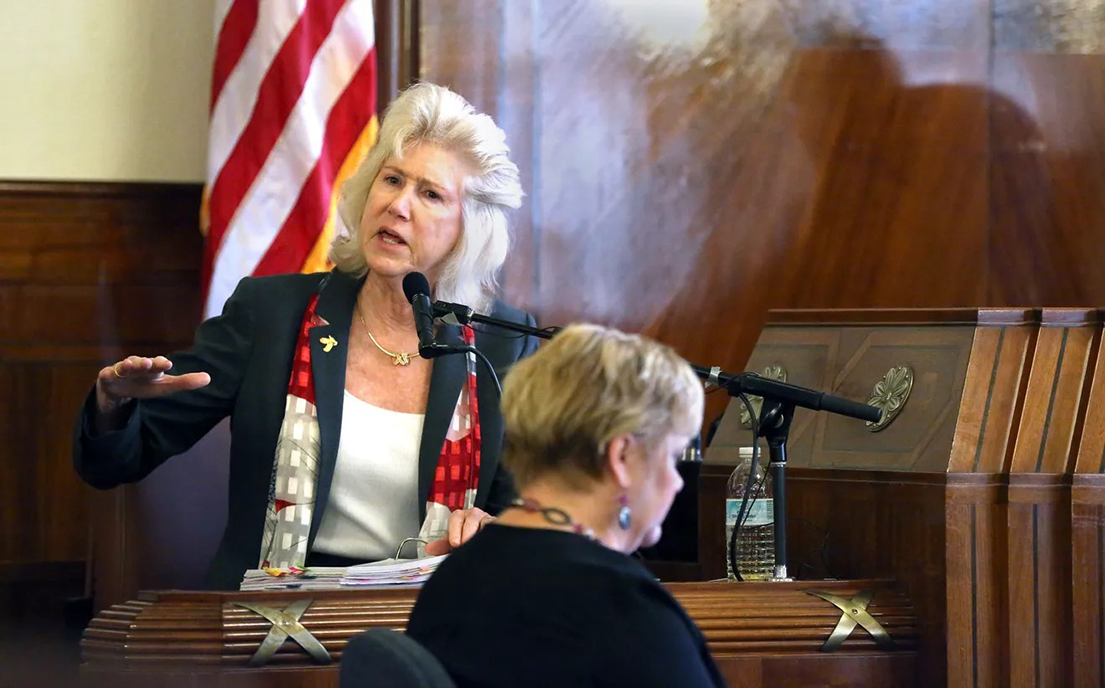More than four decades after she first set foot on the University of South Florida campus, Kathleen Heide is preparing to say goodbye. The Distinguished University Professor, who began teaching criminology at USF in 1981, will retire in August. To say she has made significant contributions to the field of criminology during her 43 years at the university would be an understatement. With a 42-page curriculum vitae – and that’s the abbreviated version – Heide is widely regarded as a leading expert on juvenile homicide and children who kill their parents, known as parricide.
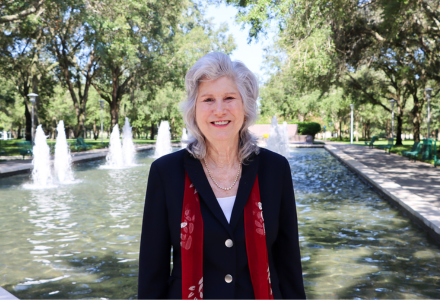
Heide on the USF campus, 2024
Heide has been recognized with six awards for teaching excellence, including USF's prestigious Jerome Krivanek Distinguished Teacher Award. She was named a fellow of the Association for the Advancement of Science for distinguished contributions to the field of criminology, particularly with respect to juvenile homicide and parricide. She was also elected to full membership in the American Psychological Association in recognition of her contributions to the field of psychology. She has authored or co-authored more than 150 publications, including four books, and has held two gubernatorial appointments to the Florida Sentencing Commission, which is responsible for establishing sentencing policies and practices for the court system. Her research has been featured by major news outlets around the world, and she has served as a consultant to the National Institute of Justice, National Institutes of Health and many state agencies. Heide has also served on 20 community boards.
Aside from her lasting mark on the field of criminology, she has also made an impact on the university community. As a dedicated professor, Heide has taught thousands of students, bringing an unmatched energy and real-world experience to her lectures. As she wraps up her final semester at USF, Heide reflected on her monumental career.
Q: The research area you’re most widely known for is juvenile homicide and parricide. How did you become interested in these unusual topics?
Heide: My interest in juvenile homicide offenders goes back to when I was a junior in college. I read a feature article in The New York Times Sunday magazine section that discussed how society had spawned “a new genetic strain of child murderer” who kills casually, gleefully and remorselessly. I thought, “Do kids like this really exist?” That article ignited a spark that has steered my research for the last 40-plus years.
I did not set out to study why kids kill parents. However, when I was interviewing juvenile homicide offenders in prison, I noticed that juveniles who killed parents tended to be different from kids who killed during a crime-related murder such as a “robbery gone wrong.” One of these juvenile parricide offenders called me following my interview with him in prison and said, “Dr. Heide, somebody has to tell the story about kids like me.” Official records corroborated the boy’s story that he had been severely abused by his alcoholic parents for years. He was in the process of running away from home when he killed his parents. The judge in the case showed the boy no mercy and sentenced him to life in prison.

Heide appeared on Larry King Live in 1992 during the widespread media coverage of her first book.
After receiving this boy’s call, I decided to write my first book entitled "Why Kids Kill Parents." That book filled a void in the literature and was of great public interest. Shortly after its publication, I was a guest on Larry King Live and multiple talk shows. This widespread media coverage resulted in me being contacted by attorneys across the U.S. and, as a result, I had opportunities over the years to evaluate kids in 18 states and Canada. These experiences contributed to my becoming the expert I am today.
Q: How has the longevity of your career led to groundbreaking projects and research?
Heide: The coolest projects in which I have been involved are a direct result of the longevity of my career. I first interviewed a sample of 59 juvenile homicide offenders in prison in the early 1980s. Thirty years later, I did a follow-up study on recidivism. This study was the longest follow-up study ever conducted on juvenile homicide offenders. At that time, 48 of them had been released despite many receiving long sentences. Of these, 88% had been rearrested, 63% for violent crimes. My graduate students and I were able to identify factors associated with success.
Then, 35 years after our first meeting, I set out to interview the original sample subjects. The boys, who ranged from 14 to 17 at the time of their arrest, were now men in their 50s. Of the original 59 subjects, 10 were dead and I was able to locate 44 of the remaining 49. Half of these men agreed to speak with me. Meeting again with these individuals more than three decades later was truly fascinating. It enabled me to see factors that distinguished the men who succeeded post-release from those who did not. This study of juvenile homicide offenders, involving interviews over time, was – and remains – the first of its kind. I enjoyed every minute of this project!
Q: What other unique experiences have you had?
Heide: I have been invited to submit articles and book chapters on juvenile homicide and parricide to prestigious research journals and books. I have been invited also to do keynote addresses in the U.S. and abroad, which have led to research consultations and collaborations with researchers and practitioners. For example, I was one of a handful of experts invited by the queen of Spain to give a talk on juvenile homicide at the Queen Sofia Center for the Study of Violence. I was also invited to give the opening keynote address on parricide at a homicide conference sponsored by Griffith University and the Australian government. I was recently invited to give the opening keynote address on my research on juvenile homicide offenders at a psychology and law conference in Taiwan.
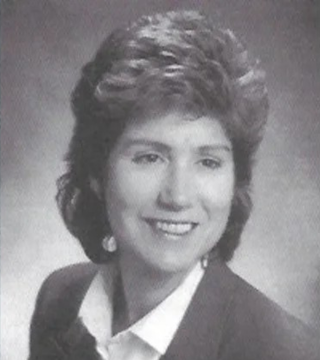
Heide, early 1990s
Over the years, I have collaborated with distinguished scholars and clinicians on juvenile homicide. For example, I was recently invited by Routledge Publishing, one of the leading global academic presses, to prepare and edit a volume on juvenile homicide. I invited renowned experts across the globe to join me in writing “The Routledge International Handbook of Juvenile Homicide.” The handbook, which has 48 chapters, covers everything about kids who kill “from soup to nuts.” It has been acclaimed as “the definitive work on juvenile homicide.”
Q: You’ve taught thousands of students and many of them have said your courses had an incredible impact because you made the learning experience “real” for them. How were you able to bring the excitement of the field into the classroom?
Heide: It was easy to bring excitement about the field because I felt it! I have always wanted my students to enjoy my classes while learning at the same time. I often started classes by talking about what was in the news. So many topics in criminal justice make the front page of the newspaper or appear on nightly news broadcasts. I would invite discussion and debate about the dynamics that led to current events, what should be done to the perpetrators and what should society do to prevent these types of incidents. When the Jan. 6, 2021, insurrection occurred, I took the opportunity to discuss the events and to focus on topics like impeachment and the 14th amendment. I would say to students, “You don’t want to sleep through this. In the next 20 to 40 years, your children and grandchildren will want to know what it was like. You don’t want to tell them that you were not paying attention.”
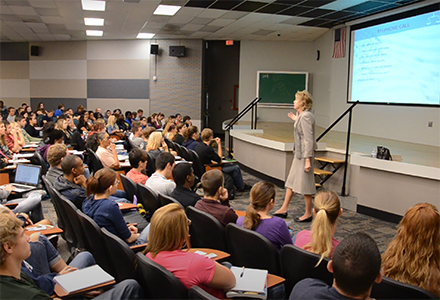
Heide’s largest classes would have as many as 440 students enrolled.
I have also routinely invited experts in the field to speak to my students. Students love to hear from those who are in the system and benefit greatly from the opportunity to interact with those on the front line, including federal, state and local law enforcement officers, judges, wardens, defense attorneys and prosecutors, convicted drug traffickers, convicted murderers and people involved in the adult entertainment industry. I’ve also invited guests such as the chief justice of the Florida Supreme Court, state senators and Florida Gov. Lawton Chiles. Students would line up after class to speak with them and it was not uncommon for these informal meetings to last for 30 to 45 minutes post-lecture.
For years, I taught a large lecture class called Crime and Justice in America that enrolled up to 440 students, depending on the classroom size, and would fill every seat. Before the era of mass shootings, I would have the SWAT team stage an incident in the classroom that would scare the students, despite warnings beforehand, and then they'd storm the classroom to rescue the students, once coming into the classroom from the ceiling!
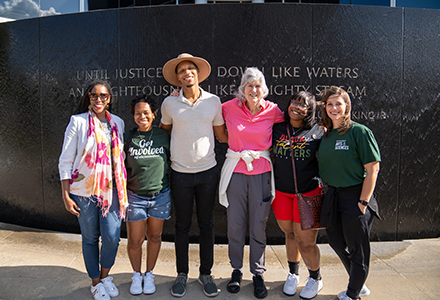
As part of the last class of her USF career, Heide accompanied a group of students on a civil rights tour.
Additionally, I believe in field trips. Being on location to witness what happens
is a completely different experience. I have taken students on countless trips to
Florida state prisons, including death row, and local jails. On dozens of occasions,
I have accompanied students to juvenile court and taken them to day programs and residential
treatment facilities for juveniles. In May, the last course of my USF career, I, along
with Elizabeth Hordge-Freeman, former USF associate professor of sociology, took 22
students on a five-day civil rights tour to visit sites in Birmingham, Selma and Montgomery.
The days were jammed pack and long. All of the students were fully engaged in the
experiences; many said that the trip was “life changing.”
Lastly, I create opportunities for students to be the expert. I routinely discuss
cases of homicide offenders in which I have been involved in or that are in the news
and ask them what they think. Students love thinking about motivational dynamics and
can be guided into applying theories by using real life examples of killers.
Q: You’ve been interviewed hundreds of times as an expert on high-profile cases such
as the Columbine High School shootings, the massacre at Virginia Tech, the murder
of Adam Walsh, and the case against brothers Lyle and Erik Menendez, who killed their
parents. Why do you think the public is so intrigued by these cases?
Heide: As noted by Dr. Alexander Lowen, a physician and psychotherapist, what repels also attracts. I think many mentally healthy people are fascinated by murderers because they wonder what could motivate someone to do something that they themselves find abhorrent, such as torturing and killing another person. For example, when parricide cases are in the news, “ordinary people,” many of them parents themselves, wonder what could cause a son or daughter – whether a child or adult – to kill the very people who gave them life. Then there are the follow-up questions that ordinary people are often reluctant to say out loud: “Could my child kill me?” “Could I kill my parents?” “Could I kill another human being?”
Q: What is the biggest lesson you hope those in the field will take from your work?
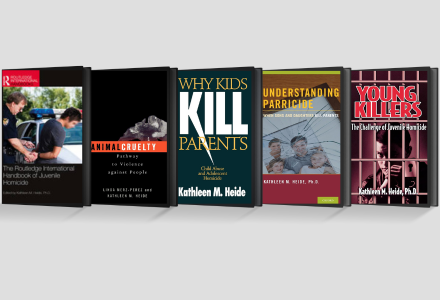
Heide has published several widely acclaimed books on juvenile homicide and parricide and co-authored a book on animal cruelty. She also edited a handbook on juvenile homicide.
Heide: There are three takeaways from my work. First, murders don’t just happen. They are the result of a constellation of factors, including individual, family, peers and life circumstances. Most juvenile homicide offenders have had many adverse childhood events that put them at risk for behaving maladaptively. Second, murders and violence by juveniles can be reduced by increasing developmental assets or protective factors. Ordinary people can make a difference in the lives of at-risk kids by taking time to acknowledge and assist them. Kindness goes a long way, particularly with respect to young people whose lives are filled with child maltreatment, poverty and myriad forms of trauma. Third, juveniles who act out are not the equivalent of adults who behave badly. With rare exceptions, they have the capacity to change. If given time to mature and provided with appropriate treatment and interventions, some juvenile homicide offenders, perhaps, many, may be able to be safely released into society in the future.
Q: You were the first female to be tenured in your department. How has the faculty and/or the department changed over time?
Heide: The Department of Criminology has changed a lot in terms of gender over the years. Today, more than half of the department’s faculty across USF’s three campuses are women. This change is clearly a reflection of more opportunities being given to qualified women. However, it is also a reflection of the larger percentage of females pursuing graduate education, including in criminology and criminal justice, compared to 40 years ago when I was a graduate student.
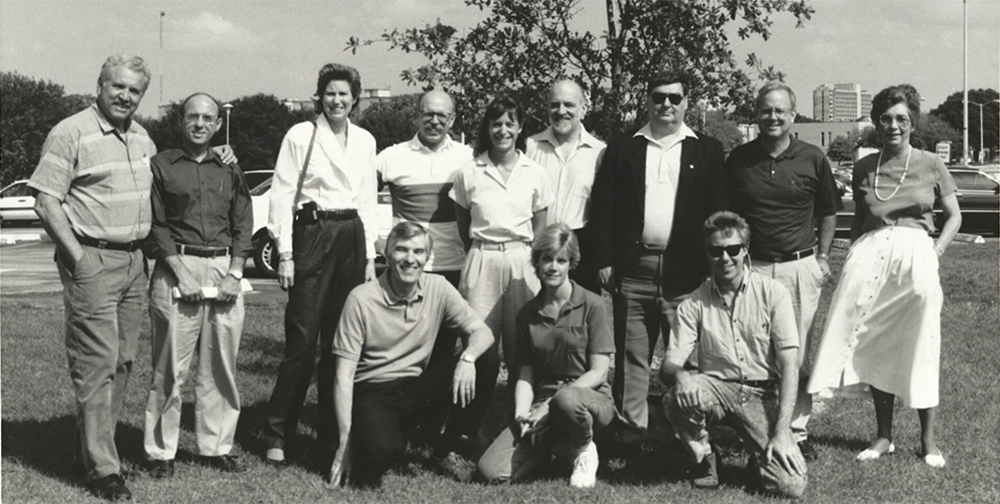
Department of Criminology faculty and staff in 1992. Heide is third from the left.
Q: As someone who spent the last 43 years as a faculty member at USF, you’ve been a witness to the university’s exceptional growth. What has it been like to watch USF succeed in tandem with your own success?
Heide: It has been thrilling! In 1981, when I was hired as an assistant professor in the Department of Criminal Justice (now Criminology), USF was a regional university. Most students came from Florida, particularly the Tampa Bay area. Today, students hail from almost every state in the U.S. and nearly 150 countries. Moreover, USF has risen in stature. I have had a front row seat watching USF be recognized as one of Florida’s three preeminent state research universities and become a member of the prestigious Association of American Universities. USF is now recognized as one of the highest ranked public universities and one of the best universities in the world, and I am so happy that I have been able to contribute to USF’s awesome status. I have become the scholar I am today because of the support provided to me and the opportunities given to me at USF. It is with gratitude and pride in my university that I retire.
Q: What accomplishment are you most proud of?
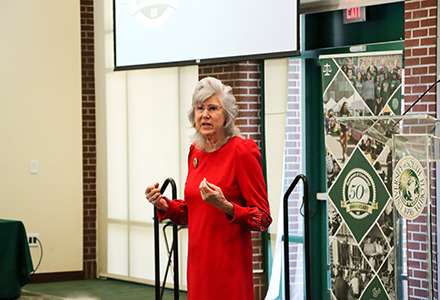
Heide speaks at the Department of Criminology’s 50th anniversary event in 2023.
Heide: That is a tough question to answer. I am proud that my work on juvenile homicide and parricide has made significant contributions to the field and that I am widely regarded as one of the leading experts internationally in these areas. I am also very proud of the students whom I have mentored and whom I have inspired to make a difference in the field and in the lives of others.
Q: What advice or words of wisdom would you give to students interested in pursuing a career in criminology?
Heide: Follow your passion, do your best, treat others with respect and kindness, and be honest and ethical in how you operate.
View Heide’s faculty spotlight.
Heide has been granted Emeritus status at USF, effective upon her retirement, which is given to individuals whose careers within the university have been exemplary and thus merit recognition and remembrance.
Heide’s retirement marks the end of an era, but her legacy will continue to live on, not only through her groundbreaking work, but also through the lives she has impacted through her teaching. To honor Heide’s more than 40 years of service at USF, the Department of Criminology established the Professor Kathleen M. Heide Criminology Scholarship to empower students who are passionate about unraveling the complexities of crime, justice and society.
